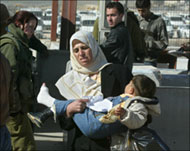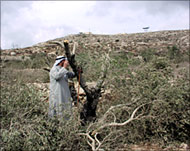Palestinian NGOs face donor restrictions
Palestinian NGOs and charitable societies are increasingly feeling the heat since the onset of the Intifada and the 11 September 2001 attacks.

Whether Islamic charities or secular human rights organizations, the result has been the same: increased conditions from donor countries and agencies on how their funds are being used in Palestine.
“There’s been a greater trend since September 11 to restrict funds being provided to Palestinian NGOs… its not just USAID [United States Agency for International Development] money, but US influence on other money provided by donor countries and agencies,” said Vicki Metcalf of the Palestinian Centre for Human Rights.
Last year, the Palestinian Monetary Fund demanded the accounts of 39 charities and NGOs working in the occupied Gaza Strip should be frozen, including al-Salah Islamic Society, the charitable wing of Hamas.
The move affected two schools teaching 720 orphans, eight kindergartens, four medical centres visited by 15,000 patients monthly and 3200 families who receive a total of $250,000 in monthly financial.
“We build schools and provide relief for orphans and the poor, we have nothing to do with terrorism,” said Abu Usama al-Kurd, Director of al-Salah Islamic Society.
Boycott
Increasing the pressure on Palestinian NGOs is a US government directive issued last year committing USAID donor recipients to pledge that no funds have made or will make their way to organisations or individuals that “advocate or support terrorist activities”.
 |
|
Four medical centres are among |
The directive list includes Hamas, its spiritual leader Shaikh Ahmad Yasin and Islamic Jihad.
Under pressure from the Jewish lobby in the United States, the Ford Foundation has started to require similar conditions for receiving its grants.
On 8 January 2004, new guidelines were added to the standard grant application binding the signatories “not to promote or engage in violence, terrorism, bigotry or the destruction of any state, nor… make sub-grants to any entity that engages in these activities”.
Contrary to USAID, the Ford Foundation does not list the specific “entities”. But failure to comply with the terms of the agreement may result in immediate cessation of funding and support from the Foundation.
Anti-Palestinian?
Palestinian civil society groups have launched a national campaign to boycott the USAID initiative.
The Palestinian NGO Network (PNGO), an umbrella organisation comprising 92 Palestinian NGOs, has urged groups not to sign the agreement and retract their signatures if they already have.
The NGOs contend that the US requirement is extremely political and anti-Palestinian in nature and is particularly problematic within the Palestinian context, where the definition of “terrorism” is contentious.
|
“What is the definition of terrorism? What we see as legitimate resistance the US sees as terrorism” Muna al-Farra, |
They fear that by accepting the conditions, and by extension the US and Israeli definition of “terrorism”, they are setting a dangerous precedent.
“What is the definition of terrorism? What we see as legitimate resistance, the US sees as terrorism. From our point of view, terrorism is state terrorism being practiced against us and the Iraqis by the Israelis and the Americans,” said Muna al-Farra of the Union of Health Workers Committees, a PNGO member.
“We cannot and will not accept that the legitimate Palestinian resistance be equated with terrorism,” added Amjad Shawwa, director of PNGO’s Gaza office.
USAID stance
USAID insists the policy is not particular to Palestinian NGOS and AID missions worldwide require that certification.
“We don’t feel whatsoever when this was written anyone had Palestinians in mind specifically,” said Monica Pataki, USAID spokesperson.
 |
|
Conditions continue to deteriorate |
“We operate in 80 or more countries worldwide and there’s lots of problems in many of those areas as well that deal with all kinds of issues, some terrorism, some political.”
Not everyone in Palestinian society agrees with the boycott. According to USAID, a large number of organisations have accepted the conditions.
“We don’t want to forgo a very significant amount of aid so hastily, so we have to be careful in how we proceed,” said Abd Allah Abd Allah, Deputy Palestinian Foreign Minister.
But head of the governmental Commission on NGO Affairs, Hasan Asfur, disagrees.
Palestinian NGOs are forbidden to sign the certification because of a stipulation in a Palestinian law that foreign assistance may only be accepted if there are no strings attached, he said.
“USAID’s demands contravene Palestinian legislation passed by the [Palestinian] legislative council [in 1999] that was welcomed by USAID at the time,” said Asfur.
Frozen assets
According to the Palestinian Ministry of Planning and International Cooperation’s (MOPIC), the US is the highest bilateral donor in the West Bank and Gaza Strip.
USAID funding for the occupied territories between 1993 and 2002 totalled approximately $1 billion.
 |
|
Israeli soldiers and settlers have |
Because of the boycott, over $5 million earmarked for Palestinian organisations has been frozen since last year. About $35 million that the US grants to the groups annually for health, education and community services, is also at risk.
Abd al-Karim Ashur, director of the Agricultural Relief Committees, said USAID withdrew a $500,000 grant for a land and rehabilitation project, after his organisation refused to sign the directive.
The project aimed to replant hundreds of acres of olive and citrus groves razed to the ground by Israeli forces last summer, and rebuild the water and sewage networks they destroyed in the same raid.
Discussions
Pataki says USAID has not yet decided what to do with the programme funds of those NGOs who refuse to sign the agreement. They are negotiating with the NGOs on an individual basis to try to come to some mutual understanding.
“We do have some projects that will be frozen until we get more information regarding the death of our personnel that were killed in Gaza,” said Pataki.
“We are listening to our Palestinian partners concerns and one of the things that we hope to be accomplishing is to encourage free speech, democratic principles, and the ability to voice your opinion.”
Asfur said the US requirements are doing just the opposite, however.
“The US government, working through USAID wants to impose on the Palestinian people political priorities that are detached from the reality of the situation in Palestine. Thus, we feel the US is in some way taking the Israeli line in dealing with the Palestinians,” he said.